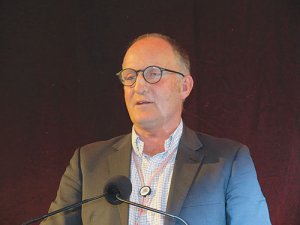Santa's present for the primary sector - an FTA with India
Primary sector leaders have welcomed the announcement of a Free Trade Agreement between India and New Zealand.
 Beef + Lamb NZ chair Andrew Morrison says the new strategy aims for better profitability and sustainability.
Beef + Lamb NZ chair Andrew Morrison says the new strategy aims for better profitability and sustainability.
New Zealand’s red meat sector has launched a new strategy to identify and unlock market opportunities and improve the sector’s sustainability, productivity and prosperity.
The strategy is a collaboration between Beef + Lamb New Zealand (B+LNZ) and the Meat Industry Association (MIA).
It sets out four key goals for the sector to achieve by 2030, including sustainably profitable, premium value, vibrant communities, and trusted guardianship.
The strategy builds on the first Red Meat Sector Strategy which was adopted in 2011.
“Our vision is to grow sustainable value together and we are committed to doing the right thing by our people, animals and environment,” said Andrew Morrison, chairman of B+LNZ.
He says the new strategy would establish critical priorities B+LNZ and MIA would work on together with industry partners.
“We have set our sights on greater profitability, sustainability and resilience. We are seeking increased value for our customers and consumers and greater social and economic benefits for Aotearoa,” he said.
Morrison says that since the first Red Meat Sector Strategy was established, co-operation continued to grow and expand into new areas.
“By partnering across the supply chain on the most important challenges and opportunities for the red meat sector, we have been able to create value for all sector participants, as well as our country, communities and consumers.”
John Loughlin, chairman of MIA, says the strategy captures work the sector is already engaged in and the opportunities that will build the sector’s future.
“By establishing clear goals and priorities, the strategy provides a platform for partnerships of shared aspiration especially with Māori, the dairy sector, other primary sector leaders and the New Zealand Government,” Loughlin said.
“Our people and businesses are integral to New Zealand’s communities and economy. We are proud of what we do and our contribution to the wellbeing and prosperity of our country, and we’ll keep working hard to constantly improve.”
Mating wrapped up last month at the across-breed Beef Progeny Test on Pāmu’s Kepler Farm in Manapouri.
Libby Judson is a keeper of memories from an age gone by. Tim Fulton tells her story.
A New Zealand-first native tree study has highlighted the Bioeconomy Science Institute's position as a forestry research leader.
Hemp fibre processor Rubisco is relocating its core processing facility to Ashburton as part of a $20-$30 million expansion to leverage what it says is an accelerating global demand for sustainable and renewable fibres.
Tradition meets some of the latest in technology at the 2026 East Coast Farming Expo.
OPINION: Trade Minister Todd McClay and the trade negotiator in government have presented Kiwis with an amazing gift for 2026 - a long awaited and critical free trade deal with India.